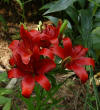|
HOME
Frog Gallery
Family
Genealogy
Favorite
Recipes
Gardening Articles by Karin
Rainfall in
East Cobb County GA
Cat Pix
Sons of the
American Revolution
Sope
Creek Garden Club
Favorite Links
| |
The Joy of
Acquisition Karin
Guzy
(slightly revised from a
version published earlier in Perennial Notes,
the quarterly journal of the Georgia
Perennial Plant Assoc.)

Red Emperor Lily |
I was reading either a catalog or a plant
book which called gardeners omnivorous. I assume this was meant in
the sense that we “take in everything”. Herbivorous, meaning
“feeding on plants”, seems more appropriate to me. It is a common
ailment among gardeners of all sorts that we must have more plants.
We must have all the varieties of our favorites - perennials, annuals,
shrubs, vines, vegetables, et al. We are insatiable. The
plants seem somehow to sustain us. |

Quince 'Texas Scarlet' |
It is a well know fact in the
gardening community that we sometimes steal to support our habit. We
steal twigs and cuttings and quite shamelessly we even take ripe seed from
anywhere. I have heard it called the rule of “admire and
acquire”. I prefer to befuddle my friends by explaining
matter-of-factly that I am simply increasing the geographic distribution
and genetic diversity of a plant by translocating seed and plant cuttings
from it.
|

Campanula |
As I wander through our garden, I see the small green
hosta that grew from seed which fell into my hand quite innocently at the
Norfolk Botanical Garden. It is an undistinguished and unidentified
plant, but it reminds me of a breezy late-summer visit to that fine
garden. In a sunnier bed there are some pink and white snapdragons
which came from the trial beds of that garden on that same visit.
These plants had no name at the time of acquisition. The sign simply
identified them as “pink and white”, and as such they have endured for
years in our garden. |

Liatris with berberis and cotinus | Theft is not the whole story of acquisition,
however. While giving a talk on propagation, the speaker asked the
audience, “Why do we go to the trouble of growing plants from seed?”
The prompt response from one gardener was “GREED”.
Many of us would
be more likely to buy a favored plant than we would be to buy bread.
When the priorities of such a gardener are questioned, it is most always
by some non-gardening, level-headed soul. Unfortunately, this person
is usually the gardener’s spouse.
| | When plant purchases begin to
mount there are other fall-back positions. Plant rescue is a noble way to
acquire plants. Many lovely and unnamed white Easter lilies grow
throughout our garden today. They were grown from a plant discarded
in a secretary’s waste basket. My woodland garden is populated by plants
collected over two weekends just in front of the bulldozers in a new
residential court. With the permission of the owner, both native and
cultivated escapees were rescued from that site. Ferns, bloodroot, mahonias, trilliums,
jack-in-the-pulpit, holly, and viburnums all came to
live in the woodland. |

Bloodroot |
| Plant exchanges at plant society meetings
have been the source of many unusual plants for our garden, but we have
also been able to share plants with others. Now parts of our garden
are growing elsewhere in some of the finest gardens in Atlanta, and even
in other states. |

Lycoris | | The passalong plants, as Felder Rushing and Steve
Bender call them, are still the best to me. The plant that a friend
wrapped in wet newspaper for you will always be special. I have a
beautiful hosta that my friend Penny gave me the year that she died and I
always think of her when I see it. There is a small holly struggling to
grow in our garden that came from my brother’s woods in Maryland.
Pieces of moss sent in plastic bags by friends and family are woven now
into the tapestry of our garden. |

Sapphireberry |
Maybe it is not the
plants we acquire,
but the pieces of life that go with them... |
| the stories, |
the
places, | the people.
|
|






